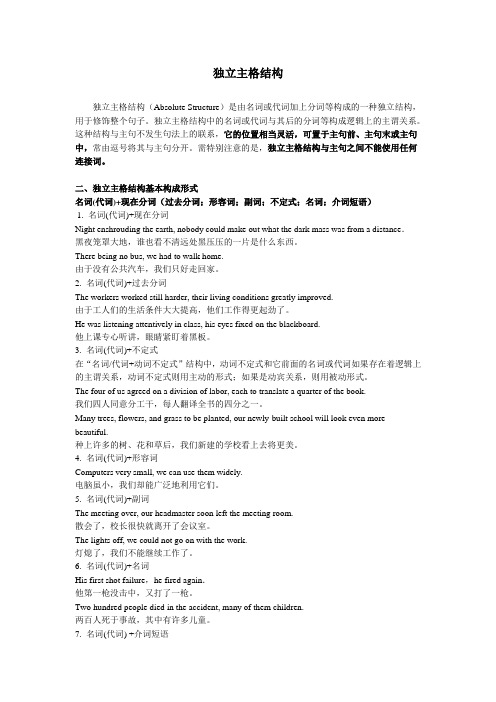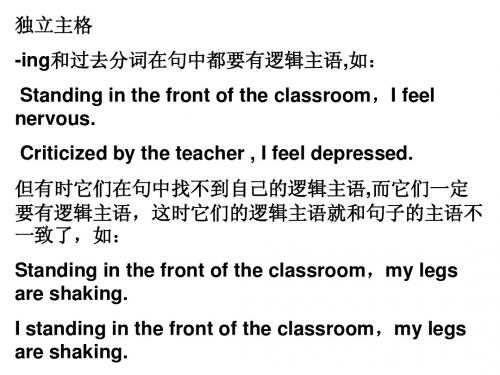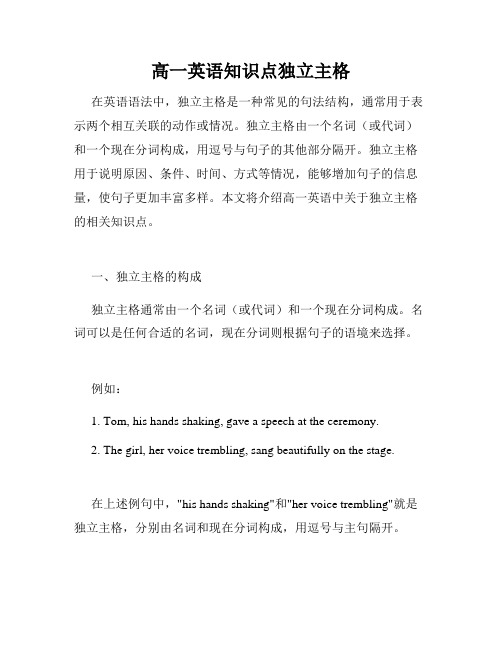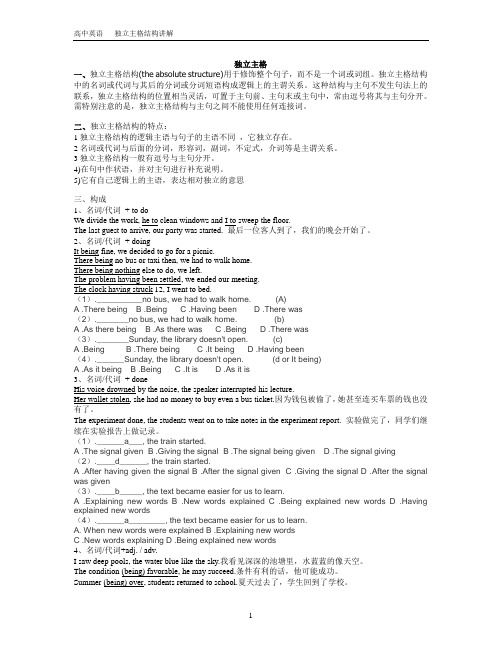高中英语语法-独立主格结构
高中英语语法——独立主格结构和with复合结构

Two hundred people died in the accident, many of them children(=andmany of themwerechildren).
两百人死于事故,其中有许多儿童。
The boywentto the classroom,book in hand(=and a book was in his hand).那男孩手里拿着书去教室。
二.with复合结构
with复合结构也是一种独立主格结构,用法同独立主格结构。主要有以下两种情况:
1.with+名词(代词)+分词/不定式
More time given (=If more time is given),we will do it better.如果多给些时间,我们会做得更好。
Homework(having been)finished(=After homework had been finished),the boy went out to play.做完作业后,这个男孩出去玩了。
He fell asleep with the windows open.他开着窗睡觉。
He came into the room,withhisdog out.他回到了房子里,他的狗在外面。
Ha large book under hisarm.他夹着本厚书,走出了图书馆。
独立主格结构主要有以下两种情况:
1.名词(代词)+分词/不定式
(分词、不定式作状语时,其逻辑主语必须与句子的主语保持一致,如果不一致时,则分词、不定式需要带有自己的逻辑主语,构成独立主格结构。此结构在句中起原因、方式、时间、条件、伴随状语从句的作用。)
独立主格结构

高中英语语法:独立主格结构的七种形式1. 名词(代词)+现在分词 The question being settled, we went home. 问题解决之后,我们就回家了。
We shall play the match tomorrow, weather permitting. 明天假设天气好,我们就进行比赛。
The monitor be1. 名词(代词)+现在分词The question being settled, we went home. 问题解决之后,我们就回家了。
We shall play the match tomorrow, weather permitting. 明天假设天气好,我们就进行比赛。
The monitor being ill, we’d better put the meeting off.班长病了,我们最好还是延期开会吧。
2. 名词(代词)+过去分词The job finished, we went home. 工作结束后我们就回家了。
The last bus having gone, we had to walk home. 最后一班公车已经走了,我们必须走路回家。
More time given, we should have done the job much bett er. 如果给我们更多的时间,我们会把工作做得更好。
3. 名词(代词)+不定式Nobody to come tomorrow, we will have to put off the m eeting till next week. 如果明天没有人来,我们将把会议推迟到下周。
So many people to help him, he is sure to succeed. 有如此多的人来帮助他,他一定会成功的。
4. 名词(代词)+介词短语The soldiers dashed in, rifle in hand. 士兵们端着枪冲了进来。
高中英语语法 独立主格结构用法全解(含答案)

独立主格结构独立主格结构(Absolute Structure)是由名词或代词加上分词等构成的一种独立结构,用于修饰整个句子。
独立主格结构中的名词或代词与其后的分词等构成逻辑上的主谓关系。
这种结构与主句不发生句法上的联系,它的位置相当灵活,可置于主句前、主句末或主句中,常由逗号将其与主句分开。
需特别注意的是,独立主格结构与主句之间不能使用任何连接词。
二、独立主格结构基本构成形式名词(代词)+现在分词(过去分词;形容词;副词;不定式;名词;介词短语)1. 名词(代词)+现在分词Night enshrouding the earth, nobody could make out what the dark mass was from a distance.黑夜笼罩大地,谁也看不清远处黑压压的一片是什么东西。
There being no bus, we had to walk home.由于没有公共汽车,我们只好走回家。
2. 名词(代词)+过去分词The workers worked still harder, their living conditions greatly improved.由于工人们的生活条件大大提高,他们工作得更起劲了。
He was listening attentively in class, his eyes fixed on the blackboard.他上课专心听讲,眼睛紧盯着黑板。
3. 名词(代词)+不定式在“名词/代词+动词不定式”结构中,动词不定式和它前面的名词或代词如果存在着逻辑上的主谓关系,动词不定式则用主动的形式;如果是动宾关系,则用被动形式。
The four of us agreed on a division of labor, each to translate a quarter of the book.我们四人同意分工干,每人翻译全书的四分之一。
Many trees, flowers, and grass to be planted, our newly-built school will look even more beautiful.种上许多的树、花和草后,我们新建的学校看上去将更美。
高中英语语法独立主格

注意:独立主格中的being或having been常可省去, 如:The meeting (being) over, all left the room.
另外:独立主格可用with复合结构来代替,其实,独立 主格前加上with就构成with复合结构,with复合结构去 掉with就构成独立主格。 She read the letter, tears rolling down her cheeks. 独立主格 She read the letter with tears rolling down her cheeks. with复合结构
看一看 1 The test finished, we began our holiday. = Because/After the test was finished, we began our holiday. 2 This done, we went home. = Because/After this had been done , we went home.
独立主格结构的构成: 名词(代词)+现在分词/过去分词 1 The test finished, we began our holiday. 2 Weather permitting, we are going to visit you tomorrow. 名词(代词)+形容词 3 He came into the room, his ears red with cold. 名词(代词) +介词短语构成 4 He came out of the library, a large book under his arm.
这就构成了独立的主语,一般为名词或代词,位于-ing和 过去分词之前,和-ing或过去分词构成独立主格。独立 主格在句中一般只作状语,而-ing和过去分词用哪种形 式,则要根据它们的逻辑主语和其所表示的动作的主被 动关系来定 如:The bell ringing, we all stopped talking. The work having been finished, she sat down to have went home. A. Our homework finished B. Our homework having been finished C. Our homework finishing D. Our homework been finished 2.Time _________,we shall visit the zoo. A.been permitting, B. permitting C. permitted D. having been permitted
高一英语知识点独立主格

高一英语知识点独立主格在英语语法中,独立主格是一种常见的句法结构,通常用于表示两个相互关联的动作或情况。
独立主格由一个名词(或代词)和一个现在分词构成,用逗号与句子的其他部分隔开。
独立主格用于说明原因、条件、时间、方式等情况,能够增加句子的信息量,使句子更加丰富多样。
本文将介绍高一英语中关于独立主格的相关知识点。
一、独立主格的构成独立主格通常由一个名词(或代词)和一个现在分词构成。
名词可以是任何合适的名词,现在分词则根据句子的语境来选择。
例如:1. Tom, his hands shaking, gave a speech at the ceremony.2. The girl, her voice trembling, sang beautifully on the stage.在上述例句中,"his hands shaking"和"her voice trembling"就是独立主格,分别由名词和现在分词构成,用逗号与主句隔开。
二、独立主格的用法1. 表示原因当独立主格表示原因时,它往往用于解释一个动作或情况的原因。
例如:1. The weather being fine, we decided to go for a picnic.2. The deadline approaching, he worked day and night to finish the project.2. 表示条件独立主格可用于表示一个动作或情况发生的条件或前提。
例如:1. The exam finished, the students were relieved.2. The rain stopping, we went out for a walk.3. 表示时间独立主格可以用来表示与主句的动作或情况同时发生的时间。
例如:1. The bell ringing, the students lined up for class.2. The sun setting, the sky turned a beautiful shade of orange.4. 表示方式独立主格用于描述主句中的动作或情况的方式或态度。
高中英语语法——独立主格结构

独立主格一、独立主格结构(the absolute structure)用于修饰整个句子,而不是一个词或词组。
独立主格结构中的名词或代词与其后的分词或分词短语构成逻辑上的主谓关系。
这种结构与主句不发生句法上的联系,独立主格结构的位置相当灵活,可置于主句前、主句末或主句中,常由逗号将其与主句分开。
需特别注意的是,独立主格结构与主句之间不能使用任何连接词。
二、独立主格结构的特点:1独立主格结构的逻辑主语与句子的主语不同,它独立存在。
2名词或代词与后面的分词,形容词,副词,不定式,介词等是主谓关系。
3独立主格结构一般有逗号与主句分开。
4)在句中作状语,并对主句进行补充说明。
5)它有自己逻辑上的主语,表达相对独立的意思三、构成1、名词/代词+ to doWe divide the work, he to clean windows and I to sweep the floor.The last guest to arrive, our party was started. 最后一位客人到了,我们的晚会开始了。
2、名词/代词+ doingIt being fine, we decided to go for a picnic.There being no bus or taxi then, we had to walk home.There being nothing else to do, we left.The problem having been settled, we ended our meeting.The clock having struck 12, I went to bed.(1).__________no bus, we had to walk home. (A)A .There beingB .BeingC .Having beenD .There was(2)._______no bus, we had to walk home. (b)A .As there beingB .As there wasC .BeingD .There was(3)._______Sunday, the library doesn't open. (c)A .BeingB .There beingC .It beingD .Having been(4).______Sunday, the library doesn't open. (d or It being)A .As it beingB .BeingC .It isD .As it is3、名词/代词+ doneHis voice drowned by the noise, the speaker interrupted his lecture.Her wallet stolen, she had no money to buy even a bus ticket.因为钱包被偷了,她甚至连买车票的钱也没有了。
高中英语语法——独立主格

独立主格结构及分词短语作状语的异同
独立主格结构与分词短语都可以转换为状语从句。但是,独立主格 结构转换为状语从句后,它有自己的逻辑主语,与主句的主语不致 (例①)。而分词短语转换为状语从句后,从句的主语与主句的主语 一致(例②)。 Time permitting, we'd better have a holiday at weekends. If time permits, we'd better have a holiday at weekends. Seeing from the hilltop, we can find the city more beautiful. When we see from the hilltop, we can find the city more beautiful.
(1)There I met several people, two of _______ being foreigners. A. which B. them C. whom D. that (2) There I met several people, two of _______ were foreigners. A. which B. whom C. who D. that (3) There I met several people, and two of _____ were foreigners. A. which B. them C. whom D. that
2.Her company prospering, Anita revolutionized…
Because her company was prospering,….
独立主格结构的基本构成形式 1、名词或代词主格 + 分词 The experiment done, the students went on to take notes in the experiment report. Time permitting, we can have a walk around the playground after supper. 2、名词或代词主格 + 不定式
高中英语语法精讲独立主格结构

高中英语语法精讲独立主格结构独立主格结构(Absolute Construction)是高中英语语法中的一个重要知识点,也是较为困惑和难以理解的一部分内容。
独立主格结构指的是由名词或代词与现在分词或过去分词构成的结构,它独立于主句的成分,但又与主句的动作、状态有一定的关系。
本文将详细介绍独立主格结构的定义、构成、用法以及常见错误。
一、独立主格结构的定义和构成1.定义:独立主格结构是由一个名词或代词(称为主格)和一个现在分词或过去分词构成,并且在句子中独立存在,不与主句的其他成分构成谓语动词关系。
2.构成:独立主格结构由以下三部分组成:-名词或代词(主格)-现在分词或过去分词-结构补充成分(可能省略)例如:1) The sun having set, we decided to go home.(由于太阳已经下山,所以我们决定回家。
)2) Her homework finished, she went out to play.(她做完了作业,就出去玩了。
)3) The weather being so hot, we decided to go swimming.(由于天气太热,我们决定去游泳。
)二、独立主格结构的用法独立主格结构常用于下面几种情况:1.表示主句和从句发生的动作同时进行例如:- The teacher leaving the room, the students began to talk.(老师离开教室,学生们就开始聊天。
)2.表示原因、条件或时间例如:- The story being interesting, I couldn't help but read it all night.(由于这个故事很有趣,所以我忍不住整夜读完了它。
)3.表示伴随、结果或程度例如:- His hands trembling, he couldn't hold the cup steady.(他的手颤抖着,无法将杯子稳住。
- 1、下载文档前请自行甄别文档内容的完整性,平台不提供额外的编辑、内容补充、找答案等附加服务。
- 2、"仅部分预览"的文档,不可在线预览部分如存在完整性等问题,可反馈申请退款(可完整预览的文档不适用该条件!)。
- 3、如文档侵犯您的权益,请联系客服反馈,我们会尽快为您处理(人工客服工作时间:9:00-18:30)。
第八章独立主格结构非谓语动词作状语时,它的逻辑主语应该是句子的主语。
但有时非谓语动词带有自己的主语,从而在结构上与主语不发生关系,我们称之为独立主格结构(Absolute Construction)。
其实,所谓“独立主格结构”也并非真正独立,它还是一种从属的结构。
一、非谓语动词独立主格结构在独立主格结构中,非谓语动词和它前面的名词或代词存在着逻辑上的主谓关系。
Such an able man to help you,you will surely succeed sooner or later.有这么能干的人来帮你, 你迟早一定会成功的。
(such an able man和to help you 之间存在着主谓关系)= Since such an able man will help you, you will surely succeed sooner or later.He seating himself at the desk, his mother began to tell him a story.他在书桌旁坐好后,他母亲开始给他讲故事。
(seating himself at the desk拥有了自己的逻辑主语he,注意是“主格”)= When he seated himself at the desk, his mother began to tell him a story.The key to the bike lost, he had to walk to school.由于丢了自行车钥匙,他只好步行去学校。
(lost 的逻辑主语是the key,lost 也可以用完成式having been lost)= Because the key to the bike had been lost, he had to walk to school.A.不定式“独立主格结构”在“逻辑主语+动词不定式”结构中,动词不定式和它前面的名词或代词存在着逻辑上的主谓关系。
这种结构也可用一个从句或并列分句来表达。
1.动词不定式用主动的形式在独立主格结构中,动词不定式和它前面的名词或代词存在着逻辑上的主谓关系。
His mother to come tonight,he is busy preparing the dinner.他母亲今晚要来,他正在忙着准备饭菜。
(= As his mother is to come tonight, he is busy preparing the dinner.)——will you go to the comcert tonight 你今晚去听音乐会吗—— many exerise-books to check,I rially can't afford any time.对不起,有这多的作业要批,我真的抽不出时间。
(=Because I shall check so many exercise-books tonight,I really can't afford any time.)The four of us agreed on a division of labour,each to translate a quarter of the book.我们四人同意分工干,每人翻译全书的四分之一。
(=The four of us agreed on a division of labour and each is to translate a quarter of the book.)Many trees,flowers,and grass to be planted,our newly-built school will look even more beautiful. 种上许多的树,花和草后,我们新建的学校将看上去更美。
(=If many trees,flowers,and grass are planted,our newly-built school will look even more beautiful.)B.-ing形式“独立主格结构”动词的-ing形式作状语时,其逻辑主语一般应与句子的主语保持一致。
Being ill, he went home.由于生病,他回家了。
(= As he was very ill, he went home.)Seating himself at the desk, he began to read a magazine.在课桌旁坐好后,他开始看杂志。
(= When he had seated himself at the desk, he began to read a magazine.)1.表示时间的-ing形式作“独立主格结构”Everyone being ready, the teacher began his class.每个人都准备好后,老师开始上课。
(相当于一个时间状语从句When everyone was ready)The chairman began the meeting , everyone being seated.每个人坐好后,主席开始开会。
(相当于一个时间状语从句after everyone was seated)2.表示原因的-ing形式作“独立主格结构”The boy leading the way, we had no trouble finding the strange cave. 由那个男孩带路,我们没有困难就找到了那奇怪的洞。
(相当于一个原因状语从句Because the boy led the way)Many eyes watching him, he felt a bit nervous. 许多眼睛看着他,他感到有点儿紧张。
(相当于一个原因状语从句As many eyes were watching him)必背:含有being的独立主格结构。
It being National Day today,the streets are very crowded. 今天是国庆节,街上很拥挤。
= As it is National Day today, the streets are very crowded.There being no further business to discuss, we all went home. 没有别的事可讨论,我们都回家了。
= As there was no further business to discuss, we all went home.3.表示条件的-ing形式作“独立主格结构”Time permitting, we will have a picnic next week.时间允许的话,我们下星期将进行一次野炊。
(相当于一个条件状语从句If time permits)My health allowing, I will work far into the night.我的健康许可的话,我愿工作到深夜。
(相当于一个条件状语从句If my health allows)4.表示方式的-ing形式作“独立主格结构”The students are walking in the school happily, each wearing a card in front of his chest. 学生们快乐地在学校里走着,每个人胸前都带着一张卡。
(相当于一个并列分句and each wears a card in front of his chest)The boy lay on the grass, his eyes looking at the sky.男孩躺在草地上,眼睛看着天空。
(相当于一个并列分句and his eyes were looking at the sky)C.-ed形式“独立主格结构”与逻辑主语+动词的-ing形式一样,如果-ed形式的逻辑主语和句子的主语不一致的话,就需要用-ed形式的独立主格结构。
The book written in simple English, English beginners were able to read it.该书是用简单英语写的,英语初学者也能看懂。
= As the book was written in simple English,English beginners were able to read it. The workers worked still harder, their living conditions greatly improved.由于工人们的生活条件大大提高,他们工作得更起劲了。
= As their living conditions were greatly improved, the workers worked still harder.He was listening attentively in class, his eyes fixed on the blackboard.他上课专心听讲,眼睛紧盯着黑板。
= He was listening attentively in class, and his eyes were fixed on the blackboard.The task completed,he had two months' leave.任务完成以后,他休了两个月的假。
(=When the task had been completed,he had two months' leave.)动词不定式表示动作没有发生或即将发生,动词-ed形式表示动作已经结束,动词-ing形式往往表示动作正在进行。
The manager looks worried,many things to settle. 经理看上去很着急, 有这么多的事情要处理。
(事情还没有处理,而且是由经理本人来处理,用不定式to settle)The manager looks relaxed, many things settled. 许多事情已经处理好了,经理看上去很轻松。
(事情已经处理好了,用动词-ed形式settled表示动作已经结束)The food being cooked, the boy was watching TV. 小孩一边做饭,一边看电视。
(两个动作同时进行)The food cooked, the boy went to bed. 饭做好了,小孩去睡了。
